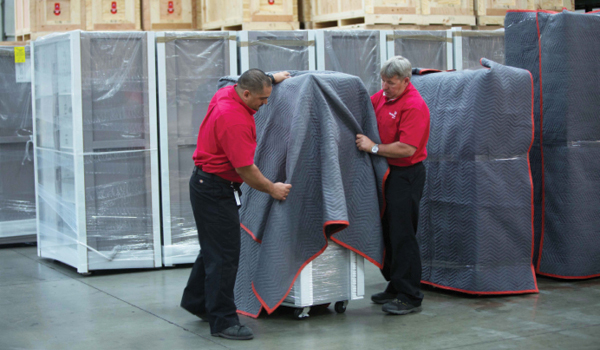How to Manage Global Specialty Cargo Supply Chains

Not all cargo fits the traditional dock-to-dock standard delivery service. Some loads require specialized equipment and additional labor to perform the delivery and meet the customer’s expectations.
Shippers in this situation may overlook the unique experience of a van line carrier, some of which are best known for moving household goods. Van line carriers have a wealth of experience moving everything from grandma’s grand piano to a multimillion-dollar CAT scanner.
Load bars, straps, pads, decking, liftgates, and pallet jacks are just some of the equipment that is standard for a van line specialty carrier. These carriers provide their customers both the option of delivering to a dock and the flexibility of delivering to locations that may require a liftgate to unload the cargo.
Medical, hospitality, electronics, retail, and telecommunications are industries that benefit from a specialty carrier.
Specialty carriers are experienced with white-glove services such as inside pickup and delivery, uncrating, equipment placement, and assembly.
Oversized cargo like generators, pressure vessels, and construction components also take specialized carriers. This type of oversized cargo often requires rigging expertise at the origin and destination. Permits, pilot cars, and other preparation for oversize loads may be necessary to move this type of shipment.
Retailers frequently utilize specialty carriers for seasonal rollouts, new construction, and store remodels that require inside deliveries performed with a liftgate. These van line carriers offer their customers the additional services of on-day and on-time deliveries and often after hours. Other additional services that may be required are uncrating, assembly of fixtures, placement according to a blueprint, and debris removal. These types of additional services are what set van line specialty carriers apart from the standard freight carriers.
Reverse logistics can sometimes be a challenge for any carrier. When most medical equipment leaves a shipper’s location, it is prepared for transport; however, the new equipment often replaces an existing piece of equipment that needs to be removed. This equipment is not packaged. Using their standard equipment, a van line carrier can protect the cargo using pads and straps to prevent damage during the return transport.
Shippers with specialized demands and complex logistical projects benefit from working with an experienced project management team to provide solutions with a single point of contact. A project manager will understand shippers’ time-sensitive needs and unique concerns and requirements, supported by industry-specific expertise and attention to detail.Precise timing and operational consistencyensure your projects are completed on schedule and according to plan.
How to Select a Specialty Carrier
Here are three types of questions shippers should consider as they select a project manager and carrier.
- Equipment Requirements. Is the cargo oversize that would require permits? Will it be loaded/unloaded somewhere other than a dock? Do you need strapping, dunning, pallet jacks, a lift gate, or other specialized gear?
- Specialized Handling Requirements. Will the shipment require inside pick up or delivery? White-glove uncrating and set up? Specialized material handling equipment? Labor-intensive manual unloading?
- Carrier Requirements. Does the carrier require hazmat certification or additional insurance requirements based on the value or risk of the load? Does the carrier have an adequate safety record?
